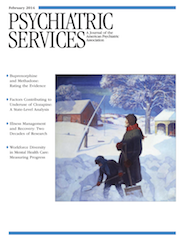Medication-Assisted Treatment With Methadone: Assessing the Evidence
Abstract
Objective
Detoxification followed by abstinence has shown little success in reducing illicit opioid use. Methadone maintenance treatment (MMT) helps individuals with an opioid use disorder abstain from or decrease use of illegal or nonmedical opiates. This review examined evidence for MMT’s effectiveness.
Methods
Authors reviewed meta-analyses, systematic reviews, and individual studies of MMT from 1995 through 2012. Databases searched were PubMed, PsycINFO, Applied Social Sciences Index and Abstracts, Sociological Abstracts, Social Services Abstracts, and Published International Literature on Traumatic Stress. The authors rated the level of evidence (high, moderate, and low) based on benchmarks for the number of studies and quality of their methodology. They also described the evidence of service effectiveness and examined maternal and fetal results of MMT for pregnant women.
Results
The review included seven randomized controlled trials and two quasi-experimental studies of MMT, indicating a high level of evidence for the positive impact of MMT on treatment retention and illicit opioid use, particularly at doses greater than 60 mg. Evidence suggests positive impacts on drug-related HIV risk behaviors, mortality, and criminality. Meta-analyses were difficult to perform or yielded nonsignificant results. Studies found little association between MMT and sex-related HIV risk behaviors. MMT in pregnancy was associated with improved maternal and fetal outcomes, and rates of neonatal abstinence syndrome were similar for mothers receiving different doses. Reports of adverse events were also found.
Conclusions
MMT is associated with improved outcomes for individuals and pregnant women with opioid use disorders. MMT should be a covered service available to all individuals.



